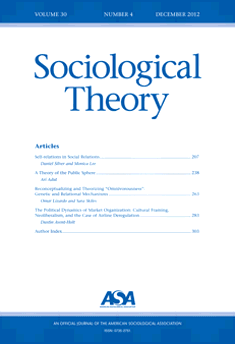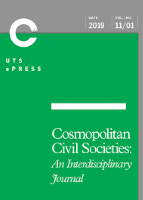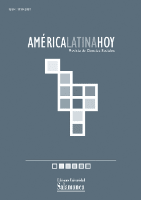
Virajes-Revista de Antropologia y Sociologia
Scope & Guideline
Connecting Scholars to Global Conversations
Introduction
Aims and Scopes
- Interdisciplinary Research:
The journal integrates various disciplines, particularly anthropology and sociology, to examine complex social phenomena and cultural practices. - Cultural Heritage and Identity:
A significant focus is placed on the exploration of cultural heritage, identity, and the dynamics of cultural preservation among diverse populations. - Social Inequality and Justice:
Research often addresses issues of social inequality, discrimination, and justice, particularly concerning marginalized groups and indigenous communities. - Historical and Contemporary Case Studies:
The journal publishes case studies that provide insights into both historical contexts and contemporary social issues, enhancing the understanding of societal evolution. - Qualitative Methodologies:
The predominant methodologies employed in the journal's publications include qualitative approaches, such as ethnography, interviews, and participatory research, which allow for in-depth exploration of social realities. - Engagement with Social Movements:
The journal highlights social movements, particularly those related to indigenous rights and cultural activism, reflecting on their implications for policy and societal change.
Trending and Emerging
- Biocultural Heritage and Environmental Issues:
An increasing trend in research on biocultural heritage highlights the intersection of culture and environmental conservation, focusing on traditional practices and their relevance in contemporary ecological contexts. - Indigenous Rights and Activism:
A significant rise in studies addressing indigenous rights, activism, and ethno-education reflects a broader societal recognition of the importance of these movements in shaping cultural and political landscapes. - Mental Health and Social Issues:
Recent publications have begun to explore themes related to mental health and social issues, such as suicide and community resilience, indicating a growing concern with psychological well-being in social contexts. - Digital Anthropology and Social Media:
Emerging research on the impact of digital technology and social media on cultural practices and community organization demonstrates a timely engagement with contemporary modes of communication and activism. - Food and Nutritional Anthropology:
There has been an increased focus on food practices, dietary patterns, and their sociocultural implications, reflecting broader conversations about health, nutrition, and identity.
Declining or Waning
- Traditional Economic Anthropology:
There seems to be a waning focus on traditional economic anthropology, which often examined subsistence strategies and economic systems of indigenous communities, as newer themes emerge. - Historical Anthropology:
Research centered on historical anthropological methods and studies of historical contexts is less frequently featured, possibly overshadowed by contemporary sociocultural issues. - Urban Studies:
The once prevalent discussions on urban anthropology and the dynamics of urbanization appear to be diminishing, as the journal shifts towards more rural and indigenous-focused studies. - Methodological Debates:
There has been a noticeable reduction in papers that engage critically with methodological debates in anthropology, indicating a possible narrowing of methodological diversity. - Focus on Non-Human Studies:
Themes related to animal studies or more-than-human perspectives have appeared less frequently, suggesting a reduced emphasis on multispecies ethnography.
Similar Journals

Cuadernos de Antropologia
Exploring the Depths of Human CultureCuadernos de Antropología is a premier academic journal published by the University of Costa Rica, Faculty of Social Sciences, that has been contributing to the field of anthropology since 1983. With its commitment to Open Access, this journal ensures that research findings are readily available to a global audience, fostering collaboration and knowledge dissemination across various regions and disciplines. Although specific metrics like H-index or Scopus Rankings are not provided, the journal's long-standing history and accessibility underscore its importance in promoting anthropological research in Latin America and beyond. Covering a broad spectrum of topics within anthropology, Cuadernos de Antropología welcomes submissions from researchers, professionals, and students, aiming to enrich the academic landscape with diverse perspectives and innovative insights. Located in the heart of Costa Rica, the journal serves as a vital platform for advancing the understanding of cultural, social, and historical contexts that shape human behavior.

Revista Espanola de Antropologia Americana
Fostering Insightful Discourse on American SocietiesRevista Española de Antropología Americana, published by UNIV COMPLUTENSE MADRID, SERVICIO PUBLICACIONES, stands as a significant contribution to the field of anthropology, particularly focusing on American societies and cultures. Since its inception in 1970, this journal has evolved, with issues currently being published until 2024, providing a platform for original research, reviews, and scholarly discourse. Despite being a Q3 category journal in the 2023 rankings, it plays a pivotal role in disseminating knowledge and stimulating academic debate within the anthropology community. With an ISSN of 0556-6533 and an E-ISSN of 1988-2718, Revista Española de Antropología Americana strives to engage researchers, professionals, and students with insightful content that reflects the dynamic nature of cultural studies. Although it operates under traditional access models, the rich array of topics covered ensures its relevance to ongoing scholarly conversation in social sciences and anthropology. Addressing a diverse array of anthropological themes, this journal is essential for anyone looking to deepen their understanding of the cultural frameworks shaping American societies.

LIBERTE
Challenging Ideologies, Inspiring PerspectivesLIBERTE is a distinguished academic journal that serves as a platform for critical thinking and scholarly discourse across various fields including Literature and Literary Theory, Philosophy, Sociology and Political Science, and Visual Arts and Performing Arts. Established in Canada and published by LIBERTE, this journal aims to foster intellectual exchange and explore the nuances of cultural and social narratives. Although it currently falls in the Q4 quartile across its categories, it is dedicated to advancing the conversation in the arts and humanities, providing a rich resource for researchers, educators, and students alike. With an ISSN of 0024-2020 and an active publication cycle running from 2002 to 2024, LIBERTE welcomes contributions that challenge prevailing ideologies and reflect innovative perspectives. While the journal is not open access, its value in promoting academic inquiry within its communities cannot be overstated.

Social Analysis
Connecting Ideas, Cultures, and DisciplinesSocial Analysis, an esteemed academic journal published by BERGHAHN JOURNALS, is at the forefront of interdisciplinary research, focusing on the dynamic intersections of anthropology, cultural studies, sociology, and the arts and humanities. Since its inception in 2002 and having transitioned to an Open Access model in 2020, the journal ensures that critical social research is widely accessible to scholars and the public alike. With an impressive Q1 ranking in Anthropology and cultural studies and holding a notable Q2 in Sociology and Political Science, it garners attention from a large academic audience, as evidenced by its high Scopus rankings: 10th in general arts and humanities and 153rd in cultural studies. This signifies its influential role in shaping contemporary discourse and providing a platform for innovative ideas and methodologies in understanding social phenomena. Based in Brooklyn, NY, the journal is dedicated to fostering scholarly dialogue and advancing the field, making it an essential resource for researchers, professionals, and students eager to engage with and contribute to the field of social analysis.

Disparidades-Revista de Antropologia
Bridging disciplines to illuminate cultural narratives.Disparidades-Revista de Antropologia, published by CONSEJO SUPERIOR INVESTIGACIONES CIENTIFICAS-CSIC, has established itself as a vital platform for scholarly discourse within the fields of anthropology, cultural studies, and linguistics since its inception. With an Open Access policy introduced in 1996, this Spanish journal ensures that critical research is accessible to a global audience, fostering interdisciplinary dialogue and knowledge sharing. Residing in the culturally rich environment of Madrid, Spain, the journal's recent categorizations within the Q4 in Anthropology, Q3 in Cultural Studies, and Q3 in Linguistics and Language indicate its growing influence in these areas, even as its Scopus rankings reflect the ongoing challenges in enhancing its visibility and impact. Aimed at researchers, professionals, and students alike, Disparidades champions innovative approaches and diverse perspectives, making a significant contribution to the understanding of socio-cultural disparities in contemporary society. By providing an accessible forum for academic research, it plays a crucial role in advancing knowledge and scholarship across multiple disciplines.

SOCIOLOGICAL THEORY
Pioneering insights that shape the future of sociological research.Sociological Theory, published by SAGE Publications Inc, is a premier journal dedicated to advancing the field of sociology through innovative theoretical approaches and empirical research. With an impressive impact factor and recognized as a Q1 journal in both Sociology and Political Science, it ranks 86 out of 1466 in its category, placing it in the 94th percentile according to Scopus metrics. This journal seeks to foster rigorous debate and insight on contemporary sociological issues, welcoming contributions that challenge existing paradigms and offer new perspectives. Founded in 1996, Sociological Theory continues to push the boundaries of sociological inquiry through its commitment to quality and relevance, making it an essential resource for researchers, professionals, and students alike. Based in the United Kingdom, this journal is not an open-access publication, but it remains widely accessible through institutional subscriptions, ensuring that its valuable content reaches a global audience interested in the dynamics of social life.

Cosmopolitan Civil Societies-An Interdisciplinary Journal
Championing Critical Research in a Global ContextCosmopolitan Civil Societies-An Interdisciplinary Journal is a respected publication from UNIV TECHNOLOGY, SYDNEY-UTS EPRESS, dedicated to exploring the intricate dynamics of civil society in a global context. Since its transition to Open Access in 2013, the journal has aimed to foster interdisciplinary dialogue among researchers and practitioners interested in anthropology, cultural studies, sociology, law, and demography. With its ISSN 1837-5391, the journal holds notable rankings, notably categorized in the Q2 and Q3 quartiles based on its impactful contributions to the field. The journal's commitment to enhancing understanding of societal structures and cultural interactions makes it an invaluable resource for scholars and professionals navigating the complexities of contemporary civil dynamics. As it continues through its convergence years from 2017 to 2024, Cosmopolitan Civil Societies stands at the forefront, promoting critical research that addresses pressing societal issues.

Procesos Historicos-Revista Semestral de Historia Arte y Ciencias Sociales
Engaging with Contemporary Debates in Social ThoughtProcesos Historicos-Revista Semestral de Historia Arte y Ciencias Sociales is a distinguished academic journal published by UNIV ANDES, dedicated to advancing research within the fields of history, art, and social sciences. With an ISSN of 1690-4818, this journal serves as a vital platform for scholars and practitioners to disseminate their findings and engage with contemporary debates in these interconnected disciplines. Although currently not open access, it provides a rigorous peer-review process that upholds high academic standards. Located in the heart of Venezuela, at AV 4 ENTRE CALLES 18 Y 19, EDIF GENERAL MASINI, PISO 3, OF A-3, MERIDA 5101, the journal aims to foster scholarly exchange and stimulate critical discussions that can influence both academic and societal perspectives. As the landscape of history and social thought continues to evolve, Procesos Historicos remains committed to highlighting innovative research and fostering a diverse range of voices in historical discourse, making it an essential resource for researchers, professionals, and students alike.

SOCIAL RESEARCH
Illuminating contemporary social issues through rigorous scholarship.SOCIAL RESEARCH, published by Johns Hopkins University Press, is a distinguished journal that has been integral to the discourse in the social sciences since its inception in 1946. With an ISSN of 0037-783X, this journal encapsulates a diverse range of scholarly articles and research findings, making significant contributions to fields such as Cultural Studies, History, Philosophy, Political Science, and Sociology. Its impressive impact factor showcases its credibility and relevance, while its current category rankings highlight its strong positioning, particularly as a Q1 journal in History and Q2 in Cultural Studies. Although not an Open Access publication, readers can access a wealth of knowledge that spans across pivotal years and topics, encouraging a deeper understanding and critical engagement with contemporary social issues. By bridging theoretical and empirical research, SOCIAL RESEARCH remains an essential resource for researchers, professionals, and students striving to advance their knowledge and impact within the social sciences.

America Latina Hoy-Revista de Ciencias Sociales
Championing Open Access for Global Knowledge ExchangeAmerica Latina Hoy-Revista de Ciencias Sociales, published by EDICIONES UNIV SALAMANCA, is a premier open-access journal dedicated to the exploration of social sciences within the Latin American context. Since its establishment in 1991, the journal has provided a platform for scholarly discourse covering a broad range of topics, including history, sociology, and political science. With an impressive Q1 ranking in History and a Q3 ranking in Sociology and Political Science, the journal exemplifies excellence and rigorous scholarship in its field. Its inclusion in prestigious databases such as Scopus, ranked #248 out of 552 in Arts and Humanities, underscores its impact as an essential resource for researchers, academics, and students alike. Based in Salamanca, Spain, the journal actively promotes interdisciplinary approaches and embraces contributions that advance the understanding of Latin American societies. With its open-access model, America Latina Hoy ensures that research findings are freely accessible, fostering knowledge dissemination and engagement across borders.